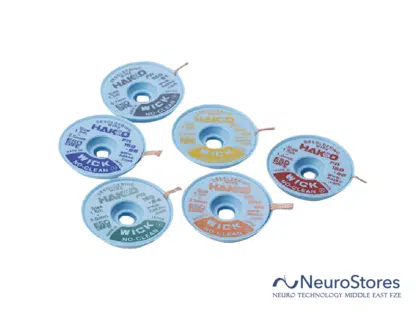HAKKO CORPORATION
![]()
- Economical and easy-to-use desoldering wire
- Handy for the removal of solder after dismounting surface-mounted components including BGAs
Features
>> Faster thermal transmission for superior performance at lower temperature and with lower wattage soldering irons.
>> Three different
· Unflux type: Untreated copper braid
Using ESD SAFE package
· No clean type: Halogen-free low-residue flux coated desoldering wire
Using ESD SAFE package
· Regular type: Rosin flux treated copper braid
Removal for thru-hole…
Removal for bridging…
Desoldering wire is used to remove solder from an elemental device or from patterns on a printed circuit board (PCB) from which surface-mounted devices such as BGA (ball grid array) have been removed.

Wrong use of the desoldering wire may tear patterns from a PCB or damage discrete components. In order to prevent these problems, make sure to take the preventive measure below:
- Apply a bit of solder to the tip of solder iron.
- Apply a bit of solder to the tip of the desoldering wire. Cut the soldered tip of the wire at an angle of 45 degrees. The solder should remain attached.
Preliminary soldering improves heat conductance. Click here for details.
How to use HAKKO WICK (Movie: 444KB)
Put the desoldering wire onto the soldering part.
Press the desoldering wire with the soldering iron on the wire
After melted with the heat of the soldering tip, the solder is sucked up into the desoldering wire
Be careful not to press the soldering tip down for too long. Otherwise, the pattern will come off.
Remove the desoldering wire and soldering iron at the same time.
| Part No. | Width (mm) | Length (m) | Case | Flux |
|---|---|---|---|---|
| Unflux type: | ||||
| FR140-81 | 0.7 | 1.5 | ESD | Unfluxed |
| FR140-82 | 1.0 | 1.5 | ESD | Unfluxed |
| FR140-83 | 1.5 | 1.5 | ESD | Unfluxed |
| FR140-84 | 2.0 | 1.5 | ESD | Unfluxed |
| FR140-85 | 2.5 | 1.5 | ESD | Unfluxed |
| FR140-86 | 3.0 | 1.5 | ESD | Unfluxed |
| No clean type: | ||||
| FR150-81 | 0.7 | 1.5 | ESD | Halogen-free, Low-residue-flux |
| FR150-82 | 1.0 | 1.5 | ESD | Halogen-free, Low-residue-flux |
| FR150-83 | 1.5 | 1.5 | ESD | Halogen-free, Low-residue-flux |
| FR150-84 | 2.0 | 1.5 | ESD | Halogen-free, Low-residue-flux |
| FR150-85 | 2.5 | 1.5 | ESD | Halogen-free, Low-residue-flux |
| FR150-86 | 3.0 | 1.5 | ESD | Halogen-free, Low-residue-flux |
| Regular type: | ||||
| 87-2-30 | 1.5 | 30 | - | Rosin |
| 87-3-30 | 2.0 | 30 | - | Rosin |
| 87-4-30 | 2.5 | 30 | - | Rosin |
| 87-4-100 | 2.5 | 100 | - | Rosin |









